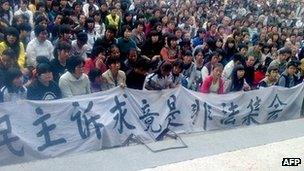China protest in Guangdong's Wukan 'vanishes from web'
- Published

Images supplied by villagers show large rallies in Wukan
China's internet censors have blocked searches relating to an ongoing protest in the village of Wukan, web users say.
Users of Sina Weibo, the country's Twitter-like micro-blogging site, say searches for Wukan return no results.
Instead, a message appears saying: "According to relevant law, regulations and policies, search results for Wukan cannot be displayed."
A land dispute in the Guangdong village intensified this week when a villager died in police custody.
Hundreds of villagers are now locked in a stand-off with security forces.
Roads into the village have been closed and are being guarded by heavily armed security personnel on one side, and villagers on the other.
Hundreds of protesters held a rally on Thursday morning in the centre of the village, the BBC's Martin Patience reports from Wukan.
'What's going on?'
Villagers accuse corrupt local officials of colluding with developers and taking their land without offering compensation.
The dispute erupted into open confrontation in September, but later appeared to have died down.
However, this week the death of a village leader who had apparently been trying to negotiate with local officials sparked another outbreak of unrest.
But postings on Sina Weibo from residents of the village have been quickly removed, as officials seek to control information about the unrest.
Searches for Wukan, as well as the cities of Shanwei and Lufeng, have been blocked.
Some web users are now referring to the protests as "WK", which can be short for Wukan or roughly translated as "what's going on?".
The latest unrest was sparked by the detention and death of Xue Jinbo, who was acting as a village representative.
The government detained him with a group of others last week, saying he was a criminal suspect being held in relation to the September protests.
But on Monday the authorities announced that he had died of a "sudden illness" on the third day of his detention.
The Lufeng city government, which oversees Wukan, said he had died after developing heart problems and "other causes had already been provisionally ruled out".
Rumours spread that he had been beaten to death by police, but reports in state media dismissed those claims.
China has thousands of rural riots and protests every year, but the Wukan unrest appears much bigger and more resilient than other outbreaks.
- Published14 December 2011
- Published12 December 2011
- Published25 September 2011
- Published14 June 2011
- Published5 March 2011